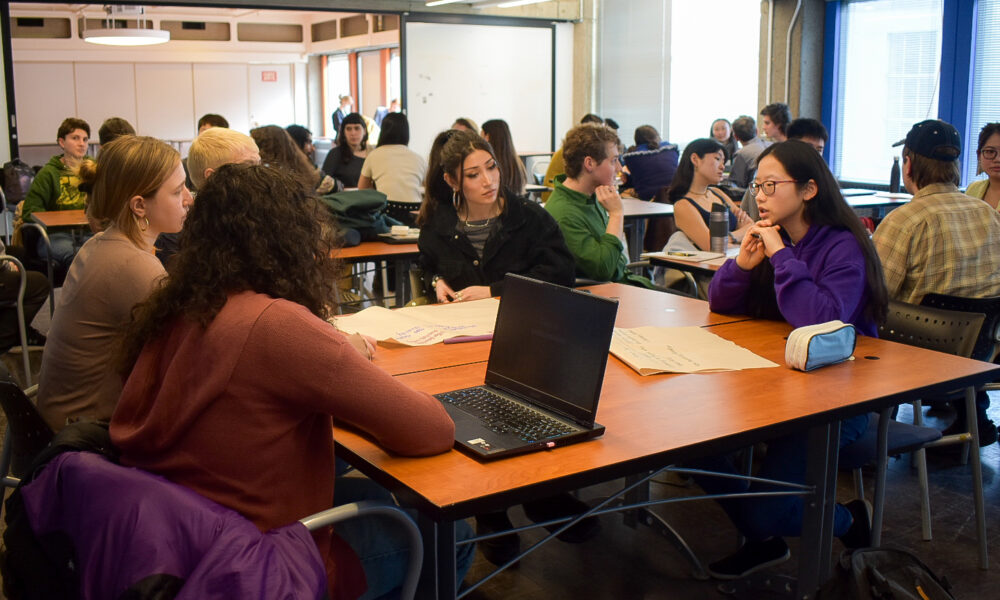Representatives from student groups across campus and beyond gathered in the University Centre for a Food Security Summit on March 15 to discuss ways to improve the sustainability, accessibility, and affordability of food systems at McGill. The summit included presentations, “visioning sessions” where attendees exchanged ideas on discussion questions in smaller groups, and a free lunch.
The summit was organized by McGill senators, representatives from the Students’ Society of McGill University (SSMU), members of food advocacy groups, and Let’s Eat McGill. Let’s Eat McGill representative and SSMU Nursing Senator Naomi Pastrana Mankovitz moderated the event, beginning with a land acknowledgement. She then defined what achieving food security looks like—all community members having “stable access to affordable, fulfilling food that is nutritious, where no student minimizes or cuts meals because of cost or insufficient options.”
In an interview with The Tribune, Pastrana Mankovitz highlighted that knowledge transmission was a key motivation for organizing the event. The choice to incorporate both presentations and discussions from and between attendees was a way of spurring collaboration and ensuring future generations of students have a base to build upon when discussing food insecurity.
“We don’t want this research that we’ve done over the years just to be lost and [future students to have to] start from scratch,” Pastrana Mankovitz said. “I wanted at this event for people to be aware of what’s already been done, and what the history is, so that we [don’t] start from scratch.”
Representatives from various groups present at the summit—including Midnight Kitchen and the Student Nutrition and Accessibility Club—then gave brief updates about their work during this academic year. Associate director of Student Housing and Hospitality Services (SHHS) Zach Suhl also addressed attendees, explaining that although students have expressed that they felt SHHS did not listen to their concerns, he is committed to maintaining greater transparency with them.
“I can promise you that I will work as best I can to support all the groups and to support students being able to eat affordably on campus,” Suhl said.
Following this, Pastrana Mankovitz gave a short presentation on the history of student advocacy for food security at McGill. She noted that during the 2000s, student societies, such as the Arts Undergraduate Society (AUS) and Engineering Undergraduate Society (EUS), managed their own cafeterias, cafes, and vending machines. Around 2007 and 2008, the university strategically took over many of these spaces and privatized them despite student resistance. This included the work of the Coalition for Action on Food Services—a group of students, staff, and faculty advocating for a food system founded upon input from the entire McGill community. Pastrana Mankovitz explained that since then, every few years “there’s been waves of student uprising” advocating for improved food security. However, each time, the movement loses momentum when organizers graduate.
Two student groups also presented projects under the Integrated Management Student Fellowship (IMSF) relating to food security, each echoing the importance of knowledge transmission and collaboration. The Food Fighters discussed their proposal to create a McGill Food Coalition (MFC) to coordinate efforts between student groups on campus. The group also described a proposal for creating a community kitchen for students to use on campus.
A second group of students called Food First presented their plans to create a guidebook—which is currently available as a draft version—to institutionalize the knowledge gathered by student activism and make it more accessible. Catherine Chen, U3 Management and member of Food First, spoke about using the history of mobilization at McGill to empower students in an interview with The Tribune.
“[My group] noticed that when we entered McGill, we just sort of accepted how it was as the norm […] the lack of non-corporatized cafes on campus,” Chen said. “Knowing that it used to be all student-run or used to be run by different companies, it’s important […] to inspire future efforts and further empower students who might wanna start their own co-op or cafe.”
Sam Liptay, U3 Science, attended the summit as a representative for the Macdonald Student-run Ecological Gardens. Liptay explained in an interview with The Tribune that one reason he came out to the event was to bring his perspective as a food producer to larger conversations about food security.
“I think it’s really interesting to see all the different levels at which people are working with food, whether it’s making it, growing it, supplying it or processing it […] or even people doing waste diversion,” Liptay said. “And understanding these problems are all part of one system that different people in the food system can contribute to in different ways.”








